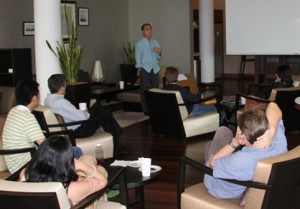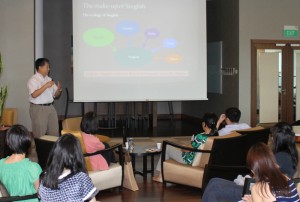
Dr. Lim Wee Hun Stephen, Senior Lecturer in the Department of Psychology, and Mr. Lam Wing Mun, an undergraduate student researcher, have been honoured for their recent research. Among all research entries received at the International Conference on Psychological Sciences and Behaviors (ICPSB 2012) held on 2 and 3 June in Hong Kong, Dr. Lim received the Best Paper Certificate for having delivered outstanding basic research in vision science. This Award was announced at the Conference Dinner Banquet and conferred by the ICPSB 2012 Chairperson Professor Dimiter G. Velev, who described Dr. Lim as “the pride of [the] Conference”.

The winning work is entitled “Illusory Objects Produce Substitution Masking Effects”. Dr. Lim commented, “This work was pursued as Wing Mun’s Honours Thesis research. Our goal was to discover what ultimately constitutes a visual object, a long-standing question that continues to fascinate all vision scientists. This work is the first globally to demonstrate comparable functional properties between physical and illusory objects in a convincing way, using an object substitution masking paradigm. In simpler terms, imaginary distractors are as capable as real ones in disrupting our identification of important targets that appear before our eyes. We are delighted to have made a very major contribution to this area of research.”
One of Dr. Lim’s international research collaborators describes him as “both an outstanding researcher and a highly talented educator and research supervisor”. Dr. Lim earlier supervised undergraduate research projects that clinched the International European Conference on Cognitive Science Best Student Paper Award in 2011, as well as the Annual International Conference on Cognitive and Behavioral Psychology Best Research Paper Award in February this year. An avid researcher, Dr. Lim currently serves on the Editorial Boards of two international peer-reviewed journals.
Congratulations to Dr. Lim and Mr. Lam on their remarkable achievement!















